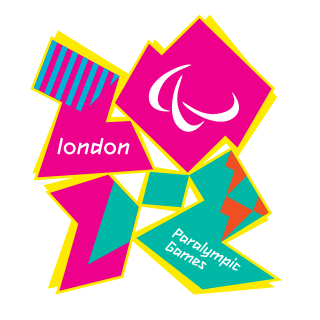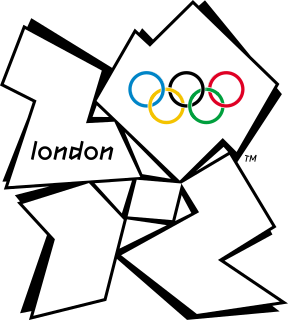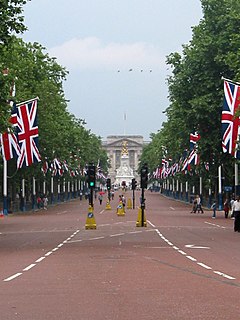
The M25 or London Orbital Motorway is a major road encircling almost all of Greater London. The 117-mile (188-kilometre) motorway is one of the most important roads in the UK and one of the busiest. Margaret Thatcher opened the final section in 1986, making the M25 the longest ring road in Europe. The Dartford Crossing is part of the orbital route but is not part of the motorway. In some cases, such as the Communications Act 2003, the M25 is used as a de facto reference to Greater London.

The London congestion charge is a fee charged on most cars and motor vehicles being driven within the Congestion Charge Zone (CCZ) in Central London between 7:00 am and 10:00 pm seven days a week.

The 2012 Summer Paralympics, the 14th Summer Paralympic Games, and also more generally known as the London 2012 Paralympic Games, were a major international multi-sport event for athletes with disabilities governed by the International Paralympic Committee (IPC), that took place in London, United Kingdom from 29 August to 9 September 2012. These Paralympics were one of the largest multi-sport events ever held in the country after the 2012 Summer Olympics, and until the date the largest Paralympics ever: 4,302 athletes from 164 National Paralympic Committees participated, with fourteen countries appearing in the Paralympics for the first time ever.

The 2014 Winter Olympics, officially called the XXII Olympic Winter Games and commonly known as Sochi 2014, was an international winter multi-sport event that was held from 7 to 23 February 2014 in Sochi, Krasnodar Krai, Russia. Opening rounds in certain events were held on 6 February 2014, the day before the opening ceremony.

The 2012 Summer Olympics was an international multi-sport event held from 27 July to 12 August 2012 in London, United Kingdom. The first event, the group stage in women's football, began on 25 July at the Millennium Stadium in Cardiff, followed by the opening ceremony on 27 July. 10,768 athletes from 204 National Olympic Committees (NOCs) participated.

The 2014 Winter Paralympics, the 11th Paralympic Winter Games, and also more generally known as the Sochi 2014 Paralympic Winter Games, were an international multi-sport event for athletes with disabilities governed by the International Paralympic Committee (IPC), held in Sochi, Krasnodar Krai, Russia from 7 to 16 March 2014. 45 National Paralympic Committees (NPCs) participated in the Games, which marked the first time Russia ever hosted the Paralympics. The Games featured 72 medal events in five sports, and saw the debut of snowboarding at the Winter Paralympics.

The United Kingdom has a network of roads, of varied quality and capacity, totalling about 262,300 miles (422,100 km). Road distances are shown in miles or yards and UK speed limits are indicated in miles per hour (mph) or by the use of the national speed limit (NSL) symbol. Some vehicle categories have various lower maximum limits enforced by speed limiters. A unified numbering system is in place for Great Britain, whilst in Northern Ireland, there is no available explanation for the allocation of road numbers.

The 2016 Summer Paralympics, the 15th Summer Paralympic Games, were a major international multi-sport event for athletes with disabilities governed by the International Paralympic Committee, held in Rio de Janeiro, Brazil, from 7 to 18 September 2016. The Games marked the first time a Latin American and South American city hosted the event, the second Southern Hemisphere city and nation, the first one being the 2000 Summer Paralympics in Sydney, and also the first time a Lusophone (Portuguese-speaking) country hosted the event. These Games saw the introduction of two new sports to the Paralympic program: canoeing and the paratriathlon.

David Russell Weir is a British Paralympic wheelchair athlete. He has won a total of six gold medals at the 2008 and 2012 Paralympic Games, and has won the London Marathon on eight occasions. He was born with a spinal cord transection that left him unable to use his legs.

Great Britain competed at the 2008 Summer Paralympics in Beijing, People's Republic of China. Great Britain sent a delegation of around 400, of which 212 were athletes, to compete in eighteen sports at the Games. The team was made up of athletes from the whole United Kingdom; athletes from Northern Ireland, who may elect to hold Irish citizenship under the pre-1999 article 2 of the Irish constitution, are able to be selected to represent either Great Britain or Ireland at the Paralympics. Additionally some British overseas territories compete separately from Britain in Paralympic competition.

The 2012 Olympic Marathon Course is that of both the men's and women's marathon races at the 2012 Olympic and Paralympic Games in London.

Canada, represented by the Canadian Olympic Committee (COC), competed at the 2012 Summer Olympics in London, United Kingdom, from 27 July to 12 August 2012. Canadian athletes have competed in every Summer Olympic Games since 1900, except the 1980 Summer Olympics in Moscow because of the country's support for the United States-led boycott. Canada sent a total of 281 athletes to the Games to compete in 24 sports. The COC set a goal of finishing in the top 12 for total medals; but the nation failed to achieve this, finishing with a total of 18 medals. Canada matched its total medal count from Beijing 2008. At London, with the initiation of its "Own the Podium" programme, Canada finished 13th in total medals, thus improving on its 14th place performance in Beijing while falling somewhat short of its self-declared goal of 12th position. It finished the event with 18 medals: one gold, five silver and 12 bronze.

Saudi Arabia competed at the 2012 Summer Olympics in London, from 27 July to 12 August 2012. This was the nation's tenth appearance at the Olympics, except the 1980 Summer Olympics in Moscow, because of its partial support to the United States boycott.

Israel competed at the 2012 Summer Olympics in London, from 27 July to 12 August 2012. This was the nation's fifteenth appearance at the Summer Olympics.

Great Britain competed at the 2012 Summer Paralympics in London, United Kingdom, from 29 August to 9 September 2012 as the host nation. A total of 288 athletes were selected to compete along with 13 other team members such as sighted guides. The country finished third in the medals table, behind China and Russia, winning 120 medals in total; 34 gold, 43 silver and 43 bronze. Multiple medallists included cyclist Sarah Storey and wheelchair athlete David Weir, who won four gold medals each, and swimmer Stephanie Millward who won a total of five medals. Storey also became the British athlete with the most overall medals, 22, and equal-most gold medals, 11, in Paralympic Games history.

ZiL lanes are lanes on some principal roads in Moscow dedicated to vehicles carrying senior government officials. Known officially in Russian as rezervniye polosy notably but not exclusively used by ZiL and Chaika brand limousines transporting high ranking government and military functionaries of the Soviet Union. ZiL lanes emerged in the 1960s during the rule of Leonid Brezhnev, replacing the previous system of having other vehicles flagged down to make way for those of top officials. A two way lane was inserted into the middle of some of Moscow's main highways in place of the central reservations, and were off-limits to all traffic but authorised civilian and emergency service vehicles. ZiL lanes and restricted routes caused considerable disruption to Moscow's traffic because of the absolute priority given to their users. The Guardian's Martin Kettle described the frustration they caused to ordinary motorists in the mid-1980s:
You can spend up to 20 minutes sitting in a lengthening queue on the bridge that crosses the main access road to the Kremlin. The lights are controlled by the Kremlin's own traffic control centre, and other cars simply have to wait. About a kilometre farther down the same road is the Oktyabrskaya Hotel, reserved for guests of the Central Committee. They, too, have a traffic priority, and when the cavalcades are leaving the hotel while the ZiLs are heading into the Kremlin, the whole of central Moscow can grind to a halt.
BC1 is a Paralympic boccia classification. The class is open to people with several different types of disabilities, including cerebral palsy. BC1 players have events open to them in boccia on the Paralympic Games program.
BC2 is a Paralympic boccia classification. The class is open to people with several different types of disabilities, including cerebral palsy. BC2 players have events open to them in boccia on the Paralympic Games program.

East Village is a housing development in Stratford, East London that was designed and constructed as the Olympic Village of the 2012 Summer Olympics and has been converted for use as a new residential district, complete with independent shops, bars and restaurants. The area was formerly contaminated waste land and industrial buildings to the north of Stratford town centre.

The Our Greatest Team Parade was a victory parade to celebrate the achievements of British athletes who competed in the 2012 Summer Olympics and 2012 Summer Paralympics. It also recognised the contributions of all the other participants and workers involved in the games. It was held on Monday 10 September 2012 at 1:30pm. The parade took place the day after the closing ceremony of the Paralympics to ensure that the maximum number of athletes were able to participate and to avoid clashing with other commitments.


















